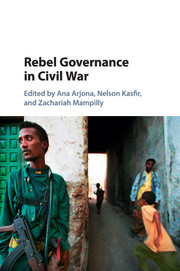Book contents
- Half title page
- Title page
- Copyright page
- Contents
- Contributors
- Book part
- 1 Introduction
- 2 Rebel Governance – Constructing a Field of Inquiry: Definitions, Scope, Patterns, Order, Causes
- 3 Del Gobierno de Abajo al Gobierno de Arriba …and Back: Transitions to and from Rebel Governance in Latin America, 1956–1990
- 4 Performing the Nation-State: Rebel Governance and Symbolic Processes1
- 5 Rebel Diplomacy: Theorizing Violent Non-State Actors’ Strategic Use of Talk
- 6 Rebel Governance During the Greek Civil War, 1942–1949
- 7 Comparing Rebel Rule Through Revolution and Naturalization: Ideologies of Governance in Naxalite and Naga India
- 8 Myths Set in Motion: The Moral Economy of Mai Mai Governance
- 9 Civilian Resistance to Rebel Governance1
- 10 Dialogue Direct:Rebel Governance and Civil Order in Northern Côte d’Ivoire
- 11 The Rebel State in Society: Governance and Accommodation in Aceh, Indonesia1
- 12 Organization and Governance: The Evolution of Urban Militias in Medellín, Colombia
- 13 Predatory Rebellions and Governance: The National Patriotic Front of Liberia, 1989–1992
- 14 Conclusion
- Index
- References
5 - Rebel Diplomacy: Theorizing Violent Non-State Actors’ Strategic Use of Talk
Published online by Cambridge University Press: 05 October 2015
- Half title page
- Title page
- Copyright page
- Contents
- Contributors
- Book part
- 1 Introduction
- 2 Rebel Governance – Constructing a Field of Inquiry: Definitions, Scope, Patterns, Order, Causes
- 3 Del Gobierno de Abajo al Gobierno de Arriba …and Back: Transitions to and from Rebel Governance in Latin America, 1956–1990
- 4 Performing the Nation-State: Rebel Governance and Symbolic Processes1
- 5 Rebel Diplomacy: Theorizing Violent Non-State Actors’ Strategic Use of Talk
- 6 Rebel Governance During the Greek Civil War, 1942–1949
- 7 Comparing Rebel Rule Through Revolution and Naturalization: Ideologies of Governance in Naxalite and Naga India
- 8 Myths Set in Motion: The Moral Economy of Mai Mai Governance
- 9 Civilian Resistance to Rebel Governance1
- 10 Dialogue Direct:Rebel Governance and Civil Order in Northern Côte d’Ivoire
- 11 The Rebel State in Society: Governance and Accommodation in Aceh, Indonesia1
- 12 Organization and Governance: The Evolution of Urban Militias in Medellín, Colombia
- 13 Predatory Rebellions and Governance: The National Patriotic Front of Liberia, 1989–1992
- 14 Conclusion
- Index
- References
Summary
The practice of rebel diplomacy is essential for violent non-state actors on the verge of new statehood or seeking legitimacy for a new regime. But effective diplomacy can serve a number of critical purposes during wartime as well. In the short term, external ties may provide material resources, training, or otherwise martial support to alter the course of fighting on the ground. Over the longer term, establishing bilateral relations with third parties, concluding trade agreements, or being allowed to participate in cease-fire or settlement negotiations can lock in strategic advantages that are difficult to overturn. Rebels face significant barriers to utilizing diplomacy, however. Some are inherent to the nature of the international system, some are erected by the embattled governing regime, and still others are endemic to rebel organizations themselves. This chapter introduces the important – and so far neglected – topic of rebel diplomacy in wartime. I argue that we can only hope to understand contemporary civil war by better understanding the interplay between violent and non-violent tactics.
- Type
- Chapter
- Information
- Rebel Governance in Civil War , pp. 98 - 118Publisher: Cambridge University PressPrint publication year: 2015
References
- 7
- Cited by



